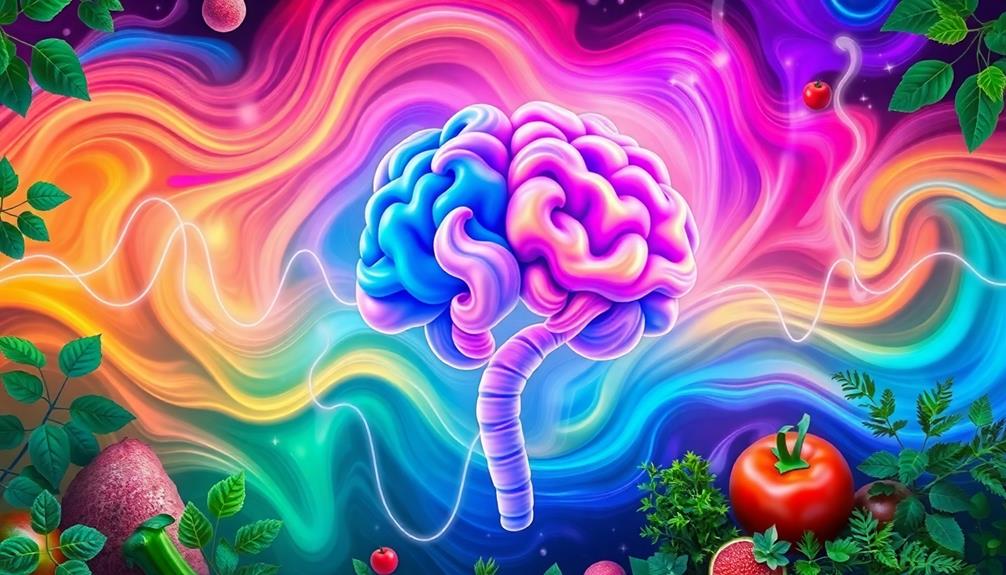Your gut health plays a critical role in your mental well-being. With over 90% of serotonin produced in the gastrointestinal tract, a healthy gut directly affects your mood and emotional stability. If you experience digestive issues, they could be linked to increased anxiety and depression. Balancing your diet with prebiotics and probiotics can help restore gut health, ultimately supporting your mental state. Remember, stress can disrupt gut function, creating a negative feedback loop. Understanding these connections can empower you to take control of both your digestive and mental health. There's a lot more to explore on this topic.
Key Takeaways
- The gut-brain axis illustrates how gut health directly influences mood and mental well-being, linking digestion to emotional states.
- Gut microbiota produces neurotransmitters like serotonin, which significantly affects mood regulation and can influence anxiety and depression levels.
- Stress can disrupt gut function, leading to digestive symptoms that may exacerbate mental health issues, creating a feedback loop.
- Eating a balanced diet rich in probiotics and prebiotics promotes gut health, which can enhance mental health outcomes and alleviate anxiety.
- Monitoring digestive symptoms and dietary habits can provide insights into gut health and its impact on overall mental well-being.
Understanding Gut Health
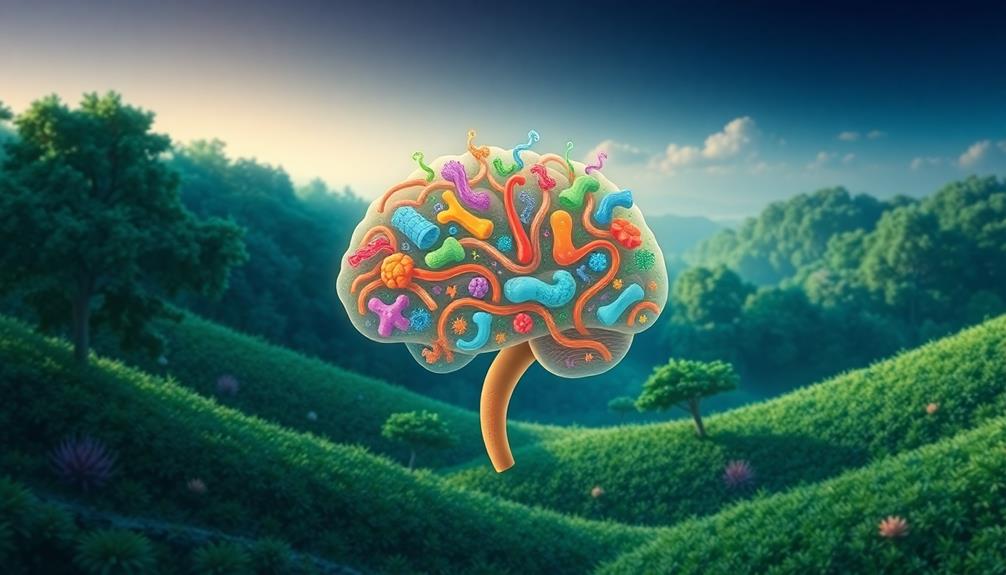
Understanding gut health is vital for maintaining overall well-being. Your gastrointestinal (GI) tract plays a significant role in digestion, nutrient absorption, and immune function, with 80% of immune cells located here. This means that what you eat directly impacts your body's defense mechanisms.
For instance, a diet rich in fermented foods, like Chinese Steamed Egg, can promote beneficial gut bacteria. The gut microbiota, made up of trillions of microorganisms, helps protect against infections and aids in nutrient absorption. However, when these microorganisms become imbalanced, you might experience digestive issues, which can also affect your mental health.
The gut-brain axis illustrates the strong connection between your gut and brain. Neurotransmitters like serotonin and GABA, produced in your gut, influence your mood and emotional state. If you notice symptoms like bloating, abdominal pain, or mood disturbances, it's important to take them seriously and consult a healthcare provider.
To maintain good gut health, focus on a balanced diet rich in fruits, vegetables, whole grains, and fermented foods. These foods support beneficial gut bacteria through probiotics and prebiotics, helping you feel better physically and mentally.
The Gut-Mental Health Link
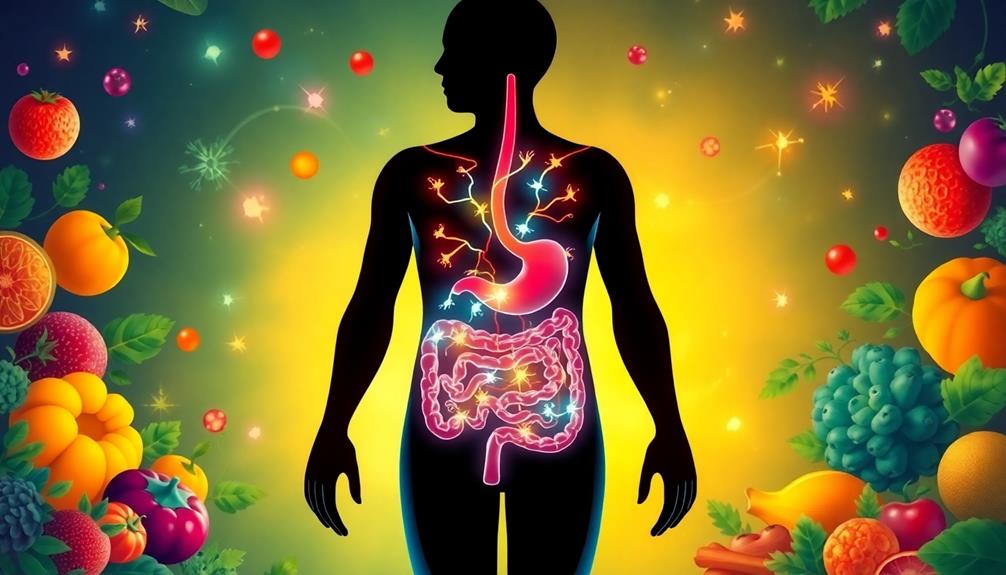
You might be surprised to learn that your gut microbiota plays an essential role in your mood and overall mental health. It produces over 90% of serotonin, a key neurotransmitter that affects your emotions and appetite.
Notably, certain foods, like those found in farm-to-table cooking, can promote a healthier gut microbiome, which in turn can positively influence your mental state. This connection between diet and mental health has gained increasing attention, as more studies reveal how a well-balanced microbiome can reduce stress, anxiety, and even depressive symptoms. Additionally, the impact of food visuals plays a significant role in not only stimulating appetite but also enhancing the eating experience, which could further contribute to overall well-being. The combination of nutrient-rich ingredients and visually appealing preparations can create a holistic approach to nourishing both the body and mind.
When stress hits, it's not just your mind that feels it; your digestive system responds too, highlighting the deep connection between your gut and mental well-being.
Gut Microbiota and Mood
The gut microbiota plays an essential role in regulating mood and mental health, primarily through the production of neurotransmitters. Over 90% of serotonin, a key player in mood regulation, is synthesized in your gut, which directly links gastrointestinal health to emotional well-being.
Notably, certain foods, such as those found in Ethiopian cuisine, can influence gut health due to their fiber content and fermentation processes. When imbalances occur in gut bacteria, you may face an increased risk of mental health disorders, including anxiety and depression. This highlights just how significant your gut's impact is on mood regulation.
If you have gastrointestinal disorders like Irritable Bowel Syndrome (IBS) or inflammatory bowel disease (IBD), you might notice higher rates of anxiety and depression. This correlation underscores the strong gut-brain connection, where your emotional states can influence gut symptoms and vice versa. The gut-brain axis allows for this bidirectional communication.
Research suggests that making dietary changes, such as increasing your intake of probiotics and adopting a plant-based diet, can improve gut health. By doing so, you might enhance your mood and overall mental health outcomes.
Understanding this connection empowers you to take charge of both your gut health and emotional well-being.
Neurotransmitter Production Impact
Over time, the intricate relationship between gut health and neurotransmitter production has become increasingly clear. Your gut microbiome plays an essential role in producing over 90% of the body's serotonin, a key neurotransmitter that regulates mood, sleep, and appetite.
Additionally, traditional cuisines, like Brazilian Cuisine, often incorporate ingredients such as cassava and coconut, which can positively influence gut health. When your gut microbiota is imbalanced, it can lead to a reduced production of neurotransmitters like GABA, which is tied to anxiety and mood disorders.
Research shows that if you have gastrointestinal disorders, such as irritable bowel syndrome (IBS), you might experience higher rates of anxiety and depression, further emphasizing the gut-brain axis. This connection illustrates how gut health can directly impact brain function and mental well-being.
Certain probiotic strains, particularly Lactobacillus rhamnosus, can positively influence neurotransmitter levels, potentially alleviating symptoms of anxiety and depression. By fostering a healthy gut microbiome, you can support ideal neurotransmitter production and enhance your mental health.
Ultimately, maintaining gut health is essential for promoting better mood and emotional balance, highlighting the importance of a well-functioning gut-brain axis in your overall well-being.
Stress and Digestive Symptoms
Amidst the pressures of daily life, stress can greatly impact your digestive health, leading to symptoms like heartburn, cramps, and nausea. This connection between stress and digestive symptoms is essential to understand.
When you're stressed, your gut may react in ways that exacerbate existing conditions, such as Irritable Bowel Syndrome (IBS). Curiously, certain foods can influence gut health, with options like Mushroom Masala being beneficial due to their rich blend of spices that promote digestion.
These functional gastrointestinal disorders often don't have clear physical causes, yet psychosocial factors play a significant role in their severity.
Moreover, stress heightens your pain sensitivity, making discomfort feel more intense if you already have gastrointestinal issues. The gut-brain axis, a communication pathway between your gut and brain, shows how emotional disturbances can trigger gastrointestinal distress.
This creates a feedback loop where stress leads to digestive symptoms, which in turn can increase your stress levels.
Importance of Gut Microbiota
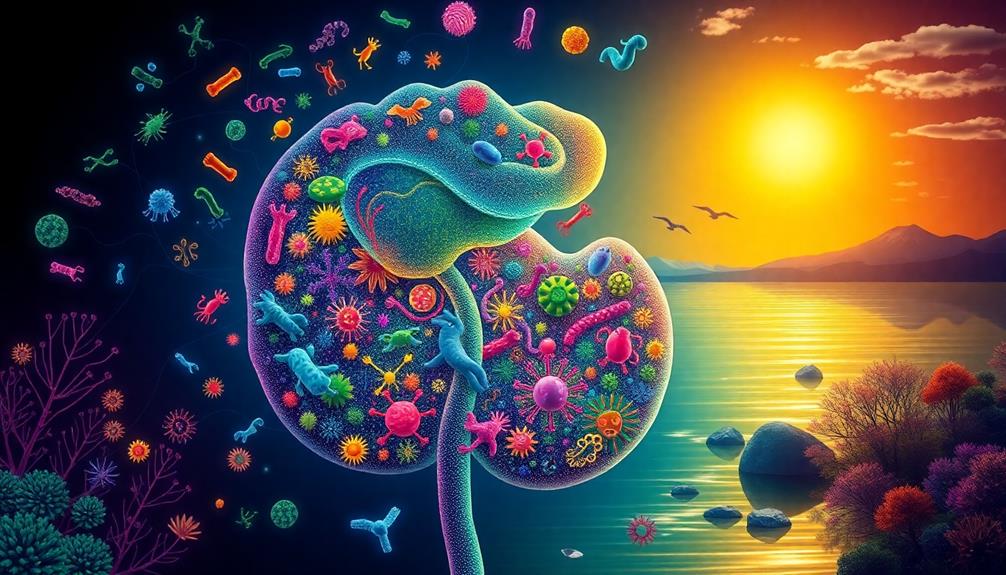
Your gut microbiota is more than just a collection of microorganisms; it's a powerhouse that influences your immune system and mental health.
By producing essential neurotransmitters like serotonin, these tiny organisms play a significant role in regulating your mood and overall well-being.
Notably, certain diets, like those rich in diverse ingredients found in traditional dishes such as Muamba De Galinha, can positively impact gut health.
Understanding this connection can help you appreciate the importance of maintaining a balanced and diverse gut microbiome.
Microbiota's Role in Immunity
Many people mightn't realize just how integral gut microbiota is to our immune health. This complex community of microorganisms plays a essential role in keeping your immune system robust. In fact, about 80% of your immune cells reside in the gastrointestinal tract, showing just how significant this relationship is.
Notably, certain foods, like Dorayaki (Red Bean Pancake), can contribute to gut health due to their ingredients and nutritional value. Here are three key aspects of how gut microbiota supports immunity:
- Barrier Protection: Gut microbiota produces barriers that enhance nutrient absorption while defending against infections, which is essential for overall immune function.
- Balancing Act: Dysbiosis, or an imbalance in gut microbiota, can lead to increased susceptibility to infections and autoimmune diseases, showcasing the need for a healthy microbiome.
- SCFA Production: These microorganisms also influence the production of short-chain fatty acids (SCFAs), crucial for immune regulation and possessing anti-inflammatory properties.
Research consistently shows that a diverse gut microbiome is linked to a stronger immune response. This highlights the importance of your dietary choices in maintaining microbial balance and, ultimately, your immune health.
Neurotransmitter Production and Mood
Gut microbiota plays an essential role in neurotransmitter production, greatly influencing your mood and emotional well-being. Over 90% of serotonin, a key neurotransmitter that regulates mood, sleep, and appetite, is produced in your gut.
When your gut microbiota is imbalanced, it can lead to decreased neurotransmitter production, increasing the risk of mental health disorders like anxiety and depression. A balanced diet rich in nutrients, including fiber found in foods such as Pasta with Tomato Sauce, can support a healthy gut microbiome and enhance overall gut health.
Specific probiotic strains, such as Lactobacillus rhamnosus, can positively affect your mental state by enhancing neurotransmitter levels in your gut. These strains have been shown to reduce anxiety and depressive symptoms, highlighting the gut's influence on your emotional health.
Additionally, gut bacteria produce gamma-aminobutyric acid (GABA), another crucial neurotransmitter that helps reduce anxiety and promotes a sense of calm.
The gut-brain axis emphasizes the direct communication between your gut microbiota and your brain, illustrating how gut health impacts emotional regulation. By taking care of your gut through a balanced diet and probiotics, you can enhance neurotransmitter production and support your mental well-being.
Prioritizing gut health is crucial for managing anxiety and depression effectively.
Dietary Choices for Gut Wellness

Embracing a balanced diet can greatly enhance your gut health and, in turn, support your mental well-being. Traditional Korean dishes such as kimchi, which is rich in probiotics, can play a crucial role in promoting gut health while also providing a burst of flavor. The right dietary choices can make a significant difference in how you feel both physically and emotionally.
Here are three key strategies to improve your gut wellness:
1. Incorporate Probiotic-Rich Foods: Add yogurt, kimchi, and sauerkraut to your meals. These foods help replenish beneficial gut bacteria, positively influencing your mood and mental clarity.
Korean fermented vegetables like kimchi are particularly beneficial.
2. Emphasize Prebiotic Foods: Foods like garlic, onions, and bananas nourish your gut microbiota. They aid in producing neurotransmitters that regulate your emotions, making you feel more balanced and centered.
3. Adopt a Plant-Based Diet: Following a Mediterranean diet, rich in fruits, vegetables, and whole grains, can enhance gut diversity. This dietary approach is linked to better mental health outcomes, helping to reduce feelings of anxiety and depression.
Symptoms of Gut Imbalance

If you're experiencing digestive issues like bloating, constipation, or excessive gas, it might signal a gut imbalance.
These symptoms can also extend to your mental health, with feelings of anxiety or fatigue cropping up unexpectedly.
Exploring culinary traditions that promote gut health, such as fermented foods, can be beneficial.
It's important to recognize these signs and consult a healthcare provider to assess your gut health effectively.
Common Digestive Symptoms
Digestive discomfort can be a frustrating reality for many, with symptoms like bloating, abdominal pain, constipation, diarrhea, and excessive gas often disrupting daily activities.
These common digestive symptoms signal an imbalance in gut health, which can lead to gastrointestinal disorders and affect your overall mental well-being.
If you're experiencing these issues, consider the following:
- Food intolerances: Symptoms may arise from lactose or gluten intolerance, indicating difficulties in digesting certain foods due to microbial imbalances in your gut.
- Fatigue and skin conditions: Chronic fatigue or acne can also be signs of gut health problems, suggesting that your digestive system isn't functioning effectively.
- Mood disturbances: Anxiety and depression may manifest alongside digestive issues, highlighting the deep connections between gut health and mental well-being.
It's essential to monitor these symptoms closely.
If they persist, consulting a healthcare provider is important for proper evaluation and diagnosis.
Mental Health Indicators
The connection between gut health and mental well-being is increasingly evident, as symptoms of gut imbalance often extend beyond the digestive system. You might notice digestive issues like bloating, constipation, diarrhea, or gas, signaling potential disruptions in your gut health. Conditions like lactose or gluten intolerance may also point to underlying gut problems, as these sensitivities can stem from imbalances in your gut microbiota.
Furthermore, psychological symptoms such as fatigue, anxiety, and depression frequently accompany gastrointestinal disorders, underscoring the gut-brain connection. Research reveals that individuals with Irritable Bowel Syndrome (IBS) often experience higher rates of mental health disorders, emphasizing the interplay between the gastrointestinal tract and emotional well-being.
Being aware of these indicators is essential. By monitoring your symptoms and consulting with healthcare providers, you can identify potential gut health issues that may impact your mental health.
Addressing these concerns not only helps restore balance in your gut but can also improve your overall emotional well-being. Remember, taking care of your gut is taking care of your mind.
Strategies for Improving Gut Health

To boost your gut health effectively, consider incorporating a variety of nutrient-rich foods into your diet.
These foods not only support your gut microbiota but also enhance your mental well-being. Here are three strategies to improve your gut health:
1. Add Probiotic-Rich Foods: Include yogurt, kimchi, and sauerkraut in your meals.
These foods contain beneficial bacteria that enhance gut microbiota diversity, which is vital for ideal gut health.
2. Consume Prebiotic Foods: Incorporate foods like garlic, onions, and bananas.
These prebiotics nourish the good bacteria in your gut, promoting a balanced microbiome essential for digestion and overall health.
3. Exercise Regularly: Engage in physical activity to boost your gut health and influence the gut-brain axis positively.
Regular exercise can enhance digestion and support mental well-being.
Additionally, don't forget the importance of a diet rich in fruits, vegetables, and whole grains for ideal nutrient absorption.
Practicing mindfulness and stress reduction techniques can also help alleviate gut-related symptoms, supporting emotional regulation.
The Role of Probiotics

Probiotics play a significant role in maintaining a healthy gut, which directly impacts your mental well-being. These live beneficial bacteria help restore microbial balance in your gastrointestinal tract, enhancing emotional regulation and mental health outcomes.
Specific strains, like Bifidobacterium and Lactobacillus, have shown promise in reducing symptoms of anxiety and depression. They work by positively influencing the hypothalamic-pituitary-adrenal (HPA) axis and inflammatory responses, which are vital for your overall emotional state.
Research indicates that probiotics can lower cortisol levels and modify stress responses, suggesting they play a role in addressing stress-related mental health issues. Additionally, probiotic supplementation has demonstrated neuroprotective effects in animal studies, enhancing neurogenesis and synaptic plasticity—key factors for cognitive function and emotional stability.
While these findings are promising, the exact mechanisms behind how probiotics influence mental health remain largely unknown, highlighting the need for more research.
Incorporating probiotics into your diet may be a beneficial step toward improving your gut health and, consequently, your mental well-being. Whether through foods like yogurt or supplements, considering probiotics could be a valuable addition to your health routine.
Stress and Gut Function
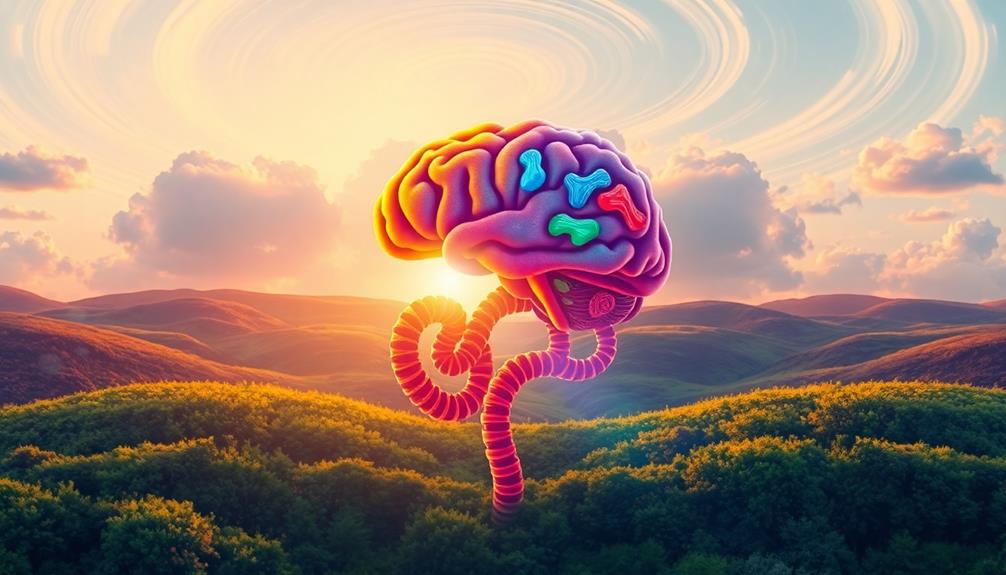
Stress often disrupts gut function, leading to a range of uncomfortable symptoms like nausea, abdominal pain, and changes in bowel habits. This connection between your gut and brain is powerful, illustrating how your emotional state can directly impact your digestive health.
When you're feeling anxious or sad, it can trigger gastrointestinal symptoms, revealing the intricate bidirectional communication between the two.
Here are three ways stress affects gut function:
- Increased Sensitivity: Stress can heighten your gut's sensitivity to pain, making existing gastrointestinal disorders feel even more uncomfortable.
- Gut Motility Changes: Stress alters how your gut moves, potentially causing irregular bowel habits that further exacerbate digestive issues.
- Dysbiosis Risk: Chronic stress may lead to an imbalance in your gut microbiota, known as dysbiosis, which can contribute to both digestive and mental health challenges.
Recognizing the role of stress in gut function is vital. By managing your stress levels, you can help mitigate the impact on your gut health and reduce the symptoms of functional gastrointestinal disorders.
Prioritizing your mental well-being can lead to a healthier gut and overall improved quality of life.
Monitoring Your Gut Health

Keeping an eye on your gut health is essential for overall well-being. Monitoring digestive symptoms like bloating, abdominal pain, constipation, and diarrhea can reveal significant insights into your gut health and potential imbalances in your microbiota.
If you notice symptoms such as fatigue, acne, or mood disturbances like anxiety and depression, these may signal underlying gut issues that need attention. You should also pay attention to any signs of lactose or gluten intolerance, as these could indicate gut dysfunction or sensitivity.
Consulting a healthcare provider can help you navigate these concerns effectively. Keeping track of your dietary intake, especially prebiotic and probiotic foods, can help you identify patterns that impact your gut health and mental well-being.
Regular appointments with your primary care provider are essential for evaluating any digestive health concerns and monitoring persistent symptoms. By staying proactive about your gut health, you can better understand its role in your mental well-being and take steps toward optimizing both your digestive and emotional health.
Resources for Further Learning

Understanding your gut health is just the beginning of your journey toward better well-being; now it's time to explore resources that can enhance your knowledge. By diving into these insightful materials, you'll better understand the connection between gut health and mental health.
- Digestive Disease Center: This organization offers a wealth of resources and services. You can find valuable information about improving your gut health through various programs tailored to your needs.
- Health Newsletters: Subscribing to newsletters like "Your Health" keeps you updated on the latest findings related to gut-brain connections. These expert insights can empower you to make informed dietary choices and lifestyle changes.
- Educational Materials: Look for articles and books that emphasize the importance of probiotics and prebiotics.
Understanding how these dietary elements support both gut health and mental well-being can greatly impact your overall health journey.
Frequently Asked Questions
Is There a Connection Between Gut Health and Brain Health?
Yes, there's a strong connection between gut health and brain health. When your gut bacteria are balanced, it influences your mood and cognitive function, highlighting the importance of maintaining a healthy digestive system for overall well-being.
How Do You Fix Gut Health for Mental Health?
To fix your gut health for better mental health, focus on a balanced diet, rich in probiotics, and incorporate mindfulness practices. Monitor digestive symptoms and consult your healthcare provider for tailored advice and potential supplements.
What Is the Top Habit Destroying Your Gut Health?
The top habit destroying your gut health is consuming too many processed foods and sugars. It disrupts your gut microbiota balance, leading to various health issues. Focus on whole foods to promote a healthier gut environment.
What Is the Link Between Gut Health and Happiness?
Imagine your gut as a garden; if it's overrun with weeds, nothing flourishes. When you nurture it with good food, you cultivate happiness. A healthy gut can brighten your mood and lift your spirits effortlessly.
Conclusion
In summary, prioritizing your gut health is essential for your mental well-being. As the saying goes, "you are what you eat," so choosing the right foods can make a significant difference. By nurturing your gut microbiota and managing stress, you can enhance not only your digestive health but also your mood and mental clarity. Remember, small changes in your diet and lifestyle can lead to profound improvements in how you feel overall. Take charge of your gut health today!
